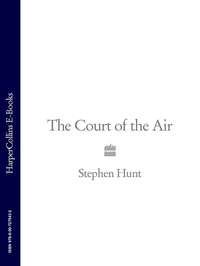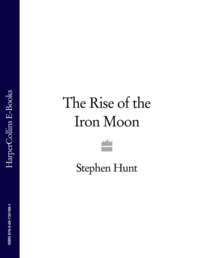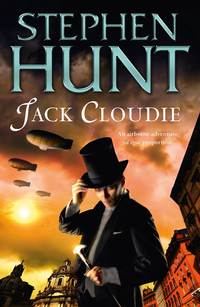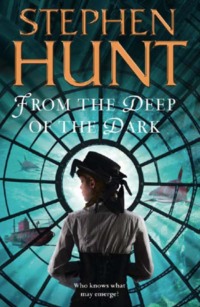
Полная версия
The Kingdom Beyond the Waves
‘A little mischief,’ said Quest. ‘I just need a little mischief to keep my mind fresh, to keep the black dog at bay. Everything is so flat and grey without my miserable few distractions.’
‘I understand that,’ said Ben Carl. ‘Just make sure your airwrights know you intend to restrict your game to the free market.’
‘Has someone been telling tales on me, First Guardian?’
Carl pointed up towards the ceiling. ‘An unattributed source. A note dropped down to land on my windowsill in parliament. You need to be careful, Abraham.’
Abraham Quest tapped the side of his nose. ‘I quite understand. Enough said.’
Carl watched his wealthy friend departing across the clubroom. For the industrial lord’s sake, Carl hoped Abraham Quest would be true to his word. Because if he was not, the statuesque mercenary he had watching his expensive back would not be nearly enough to protect him. Not if the Court of the Air came calling on him in judgement.
The butler returned to refill his jinn glass. His black club livery was barely enough to disguise the fact that the servant was really an agent of the political police. A g-man. Ben Carl was still not used to the fact these dogs were his hounds now, rather than part of a pursuit baying behind his own heels.
‘Do you think he will listen to you, sir?’
‘The cleverest gentleman in Middlesteel?’ sighed the First Guardian. ‘How should I know?’
‘We still do not know what he is up to at the Ruxley Waters airworks.’
‘Airships are just toys to him, like everything else,’ said Carl. ‘Toys to be made to go further, faster, higher.’
‘They are the Royal Aerostatical Navy’s toys, sir. He only gets to build them.’
‘He is a good man,’ said Carl. ‘A humane man. Half of our land’s mill workers eat better and work fewer hours because of the standards set by the model factories of the House of Quest. He has done more for the people of Jackals than I have managed to achieve with my factory acts. He is a patriot.’
The police agent refilled the politician’s glass and gave a short bow. ‘As are we all, sir, as are we all.’
Chivery did not like having the new boy foisted upon him like this. It was dangerous enough making a living as a smuggler in Jackals, rolling the dice that Greenhall’s revenue agents didn’t have the smuggler’s favourite bay outside Shiptown under observation at night, looking for u-boats like theirs cutting the line. Dangerous enough, without having some green young ’un like Tom Gashford given into his care to nursemaid. A boy who talked too much when he should have been quiet and said nothing at all when he should have been talking. But it was understandable that the skipper of the Pip Sissy wanted to pair young Tom with an experienced moonlighter like Chivery. The lad needed experience of the hidden paths the smugglers took through the forest, the clearings where casks of untaxed brandy and mumbleweed could be passed onto the moonrakers’ secretive wholesalers.
Young Tom seemed convinced that their proximity to the cursewall would lead the redcoats down upon them. Since the attempted invasion, the Frontier Foot had been reinforced all along the Jackelian border, from Hundred Locks in the north to the Steamman Free State in the south. But the tremblers that the redcoat engineers had burrowed into the ground were for detecting sappers’ tunnels deep enough to cut under the cursewall, not designed to catch a couple of smugglers out plying the coast’s oldest trade. Having the lad with him was a risk, all the same. Of all the cargoes the canny submariners of the Pip Sissy smuggled out of Quatérshift to bring into Jackals, the contents of Tom’s sack were going to prove the most lucrative this cold night. The lad kicked his heels against the frost and the darkness. He obviously wished he were bunking back in the warmth of their u-boat too.
‘If there weren’t revenue men abroad tonight, I’d burn this rubbish to warm my fingers and damn the risk of the firelight,’ said Tom, swinging the sack nervously between his hands.
The older moonraker laid his hand menacingly on his belt dagger. ‘Then you’d be a right fool, Tom. It’d be a tuppence turn of a coin whether our customer would slit your throat before the skipper tied you to the Pip Sissy’s conning tower and towed you back to Quatérshift for the crabs.’
‘Why should someone pay us good money for this rubbish, Chivery?’ The lad pulled out a handful of yellowed pamphlets from the sack and read out a few of the titles in the moonlight. ‘Directives of the First Committee. The heroes of the Faidéaux carriage works – an exhortation to labour. Equality’s Tongue: the thoughts and purity of the revolution. There ain’t anybody in Jackals that collects this revolutionary guff anymore, not since the war.’
Chivery lit the bull’s-eye lamp he carried with him, making the signal that they were ready to trade. He took advantage of the tightly focused light to unroll the penny sheet he had brought with him. The Northern Monitor: respectable opinions, honestly and directly expressed. Its front cover bore an illustration of the First Guardian, Benjamin Carl, holding a four-poles bat with the words Jackelian oak carved on it. Bounding off the wood was the head of one of the First Committee of Quatérshift, while various caricatures from parliament clapped politely on the sidelines. There was a speech bubble rising from the leader of the opposition, Hoggstone, which read ‘Your game m’lord.’
The great terror was still in full swing in Jackals’ neighbouring nation. Every month the Pip Sissy made its smuggling run, and every month their friends, contacts and colleagues in Quatérshift seemed gaunter and more malnourished. Made prematurely old by the upheavals – purge after purge – famine after famine – entire families dragged from their villages to the quick, deadly mercy of a Gideon’s Collar, the steam-driven killing machines that dominated every town square in Quatérshift. As Chivery’s news sheet indicated, even a high position within the Commonshare elite was no protection against the twitchy paranoia of the shifties’ secret police units or the whims of the street mob. Quatérshift was not a functioning republic any more – it was a dog gnawing on its own wounded, diseased flesh. The smuggler shook his head sadly. People got themselves into the strangest of pickles with their damn fool passions. If anyone in Jackals started carrying on like that, why, their neighbours would sneak them a visit one evening and give them a right good dewskitching – look on it as a favour done to them, too.
‘What’s that noise?’ Tom looked around.
A whistling from the sky, then a dark monstrous shape dropped through the canopy of trees, leathery wings folding up like an angel of hell. Yelping, the lad stumbled back and fell over a branch.
Chivery picked up the boy’s fallen bag from the grass. The lad looked on in astonishment. It was not one monster – it was two. The reptilian flying creature had dropped his passenger in the middle of the clearing and stepped back, wrapping his wings around his sides. It was a lashlite. A lashlite carrying a human-shaped figure. But was it a human? Dark high boots, black cape, a face concealed underneath a devil’s mask. Now the tales came back to the boy. The scourge of Quatérshift, vengeance taken human form. Furnace-breath Nick.
Some said Furnace-breath Nick was the ghost of a Quatérshiftian nobleman come back from hell to haunt his executioners. Others claimed that he was a member of the Carlist revolution who had been betrayed and purged by the new rulers of the land – a spirit of death hunting his old compatriots. A few maintained that Furnace-breath Nick was a dark angel of the Quatérshiftian sun god, sent to punish the newly atheist republic that shared half of Jackals’ border.
‘Do you have it?’ The devil’s voice echoed around the clearing as if it was being sucked up from hell. Something inside the figure’s mask was altering his voice, making his words hideous.
Chivery was not bothered. He had gone through this ritual many times before. ‘For the money, I have it.’
A black-gloved hand lashed out, and a purse of coins spun across to be caught by the smuggler. Chivery bounced the coins in his palm, jangling them. ‘A bargain well met.’ He tossed the sack filled with Quatérshiftian propaganda over to Furnace-breath Nick.
‘I trust there will be another delivery next month?’
‘It’s getting harder,’ said Chivery. ‘Not because of the Carlists, mind. They’re still in a right old state. The First Committee wouldn’t notice if we snuck into the Palace of Equality and painted their arses blue right now.’
‘There will be no extra money,’ Furnace-breath Nick told the smuggler.
Chivery went on, ignoring the comment. ‘It’s our own damn navy. They’ve stepped up airship patrols along the coast. It’s getting so we can’t break the surface off a Quatérshiftian cove without some RAN stat chasing us down.’
‘When the drinking houses of Hundred Locks run dry of smuggled brandy, I shall believe it’s too dangerous for you to break the blockade,’ said Furnace-breath Nick. ‘Until then … besides, like your boy says, this literature is just worthless junk.’
Terrified, the young smuggler tried to crawl back into the woods. Furnace-breath Nick had been secretly listening in to his conversation.
‘Worthless to some,’ said Chivery, clinking the bag of coins again. ‘Yet you seem to place some value on it.’
‘Oh yes,’ laughed Furnace-breath Nick – not an encouraging sound. ‘But sink me, don’t people say I am quite insane?’
With that, Furnace-breath Nick was seized by the lashlite, the beating of the creature’s wings sending the two smugglers’ tricorn hats blowing off into the trees as the devil-masked figure and the winged beast that served him vanished into the sky.
‘That was him,’ said young Tom. ‘The one in the sheets. Furnace-breath Nick.’
‘It was,’ agreed Chivery. ‘And you thought moonraking was boring, eh?’
‘But he’s the devil of Quatérshift, ain’t he, the scourge of the Commonshare? What does he want with a sack full of useless shiftie political pamphlets?’
‘Something to warm his fire during a cold evening, boy? Damned if I know. In fact, if I did know, I probably would be damned. Just, I suspect, like he must be.’
CHAPTER THREE
Quirke opened his door, the sadness in the academic’s normally sparkling eyes a fair indication of what was to follow. ‘Amelia, do come in.’
Professor Harsh followed the head of the School of Archaeology at Saint Vine’s College into his comfortable old office, the sense of foreboding in her gut mounting. The table by the window held a steaming pot of caffeel, rising vapour from the brew obscuring the quad below, where gaggles of brown-gowned students were being called to seminar by the steam-driven whistles running along the battlements of the ancient university. The brew’s presence settled it. Quirke might as well have placed an executioner’s cap on his desk.
‘Do sit down, my dear.’ The elderly fellow pulled a polished gem out of his tweed waistcoat’s pocket and placed it on his desk. It was the same jewel Mombiko had removed from the tomb in Cassarabia’s mountains.
‘I thought the university would have that under museum glass by now – or sold off by one of the Cripplecross auction houses?’ said Amelia.
‘The High Table does not know of its existence yet, Amelia.’
She looked across at Quirke, puzzled.
‘This arrived for you while you were gone.’ He passed a cream vellum envelope across to her. Taking the copper letter opener from the academic’s desk, Amelia sliced the envelope open. She unfolded the notepaper, going numb as she read the words.
‘They can’t do this to me!’
‘You don’t have tenure, Amelia. Of course they can.’
She angrily crumpled the paper into a ball with a gorilla-sized arm. ‘Saint Vines is the last college that would take me. What am I meant to do now? Accept a job as a governess teaching the snotty sons of Sun Gate quality the difference between the great civil war and last winter’s bread riots?’
‘What was the Chancellor expected to do, Amelia? You were supposed to be working at a dig along the dyke wall. Instead some uplanders discover you wandering about half-dead along the desert border. Your obsession with the city is destroying your life.’
‘The High Table are fools,’ said Amelia. ‘Fools with closed minds who are so brim-full of prejudice that they can’t see that the city is not a myth. It existed. Out in the desert I found the tomb of the man who as like destroyed it!’
Quirke shook his head and spun the globe that sat on his desk, his finger brushing the vast expanse of the Fire Sea as it rotated. ‘The academic council values orthodoxy, Amelia. A legend without solid evidence makes for very poor archaeology. You should be thankful that the Cassarabian ambassador was expelled last year, or I don’t doubt we would have Greenhall’s civil servants and magistrates crawling all over the college looking for you with a bag stuffed full of embassy grievances.’
‘Give the jewel to the Chancellor,’ said Amelia. ‘The money from it—’
‘—Will not make a difference,’ said Quirke. He pushed the gem across the table to the professor. ‘Not this time. You could have come back with an original scroll of the Circlist tenets and he still would have dismissed you. Even if by some miracle you could find evidence that the city of Camlantis really existed, that it is still intact and locked as a floatquake in the heavens, how would you reach it? The aerostats we have access to are only pocket dirigibles – do you think the RAN can be enlisted on your goose chase?’
‘Admiralty House has been known to favour requests by the High Table …’
The old academic picked up a neatly folded copy of the Middlesteel Illustrated News. ‘This is what the navy are concerned with.’ He tapped a report about an airship of the merchant marine that had been savaged by a skrayper, one of the massive balloon-like creatures of the upper atmosphere that sometimes sank down to wreak havoc on Jackelian shipping. ‘You find a text in a crystal-book about how to drive skraypers off our airships and you’ll find the First Skylord willing to grant you an audience at Admiralty House quick enough. But searching the skies for Camlantis? What do you think the RAN will make of that proposal?’
‘The city is up there,’ insisted Amelia.
‘If the ruins of Camlantis were at an altitude we could reach, someone would have sighted them. Circle knows, the jack cloudies are as bad as their maritime counterparts with their superstitions and their rituals and their cant. It wouldn’t take much to add a story of a ghostly land ripped out in a floatquake to their tall tales of angels gliding around their airships and dark round stats of unknown origin whistling past their ears. And if your mystical city is resting at an altitude beyond our sight and reach, well … I am sure you can see the problem.’
‘The lashlites believe the city is up there,’ said Amelia. ‘I told you about my trip to their nests in the mountains. Their songs tell of a city that could have been Camlantis, rising past a flight of warriors out hunting a skrayper pod.’
‘The lashlites are a colourful race,’ said the academic. ‘I dare say I could find something in their aural teachings to support most of the tales of celestial fiction printed in the penny dreadfuls, if I chose to interpret their sagas in such a way.’
‘You are sounding like the dullards on the High Table.’
‘Yes,’ sighed the academic. ‘I believe I am.’ He stood up and pulled out a tome from his shelves. ‘Uriah Harthouse. Two years’ worth of lashlite shaman sagas transcribed during an expedition to the peaks around Hundred Locks fifty-five years ago. I particularly like the story where the god Stormlick engages twelve ice demons in a whistle-song contest in a wager to end the coldtime, triumphing by cunningly adding a mustard-like spice to their wine goblets when the demons weren’t looking. Try selling the Department of Geographical Studies that gem as an explanation of the glaciers’ retreat from the continent.’
‘This isn’t myth we are talking about, it is history.’
‘History is out of fashion in these corridors,’ said Quirke. ‘We have too much of it, we are drowning in it.’ He opened a drawer in his desk and lifted out a coin in a glass box, the face on the silver so faded that the impression of the woman’s head was barely discernible. ‘How old do the wild papers in those disreputable journals of yours propose Camlantis might be? Seven thousand years? Eight thousand years? I found this coin in one of the archives downstairs while I was writing a piece on the reign of King Hull. Out of idle curiosity I had Pumblechook in metallurgy use that new dating process he’s been boasting about – do you know how old this coin is according to his new method?’
‘Chimecan slave-nation period?’
Quirke lifted an eyebrow. ‘Two hundred and seventy thousand years old. How’s that for a heresy?’
Amelia nearly spilt the contents of her cup. ‘That’s impossible. Pumblechook must have made an error.’
‘You plough the fields in Jackals and you trip over history, you cast a fishing net in the Sepia Sea and you dredge up history. We have too much of it, and the High Table have had too much of yours.’
‘What are you going to do with the coin?’
‘What am I going to do?’ Quirke opened the drawer and placed the artefact back inside the felt-lined case. ‘I shall keep it as a reminder that there are things in this world older than I am. You’ll see no papers from me speculating on the origins of the coin. I’ll leave it to you in my will – you can have it along with my office, when the High Table have forgotten your name and your impudence towards them.’
‘I shall never be the sort of person they believe fit to sit in here,’ said Amelia.
‘You’ll see,’ said the academic. ‘In time, you’ll see.’
‘Fools, they’re blind, bloody fools.’
‘Some advice, Amelia,’ said Quirke, passing a cup of cafeel over to the professor. ‘As one of your father’s oldest friends. Don’t publish any more papers about the city; keep your head down and let the procession of nature take its course. The membership of the High Table will change, and in time fresh faces will arrive who have never heard of you. There is a dig along the foothills of Mechancia, some Chimecan-age ruins overrun by glaciers during the coldtime. I can get you on the expedition – you’ll just be another anonymous face helping out, a few years beyond the reach of the official journals and your enemies.’
‘Academic exile.’ Amelia set aside her cup without drinking from it.
‘I taught you better than that, my dear. A tactical withdrawal. Entropy can be an astonishingly powerful ally in these sleepy halls of ours. The long game, my dear, the long game.’
Amelia stood up. They both knew she was not going to follow his advice, and the old man had damaged his own prospects enough already by making Saint Vines her last bolt-hole within the eight universities.
‘You stood by my father after he lost everything,’ said Amelia, ‘and you have done the same for me. You are a rare old bird, Sherlock Quirke.’
He shrugged. It had never even occurred to the old academic that there was an alternative way of doing things. He was a singular touch of humanity among all the bones and dust of forgotten things.
She made to open the door and leave.
‘Amelia, did it ever occur to you that some things that are lost are meant to be that way for a reason?’
Now that was a queer thing to say. Was that the master of archaeology, or her dead father’s friend talking?
Amelia shut the door on Quirke and her old life.
Amelia could see there was something wrong with the woman in the quad the moment she left the college building – something out of place. She was the right age to be a student but her poise was wrong; like a panther waiting patiently on the lawn, carefully watching the bustle of the undergraduates. Could she be a topper sent after her by the caliph? The Circle knows, there was always a surfeit of professional assassins in Middlesteel, ready to do the capital city’s dirty work when enough coins were spilled over the bench tops of the more disreputable drinking houses.
She noticed Amelia and started to walk towards the professor, the shadows falling behind her. The visitor was approaching with the sun in her eyes. Amelia relaxed. The woman was not planning to try to sink a blade between her ribs after all.
‘Damson Harsh?’ enquired the young lady with a slight accent. Where was that accent from? It had been softened by years in Jackals.
‘Professor Harsh,’ said Amelia.
The woman pulled a folded sheet of notepaper from her jacket. ‘You are, I believe, currently in need of employment. I represent an individual who may be interested in offering you a suitable position.’
Amelia arched an eyebrow. ‘You are suspiciously well informed, damson.’
The visitor handed Amelia the piece of paper. ‘The offer is contingent on you being able to translate the text you see here.’
Amelia unfolded the sheet. It was not possible! The script on the paper was nothing this young woman should have in her possession.
‘Is this a joke?’
‘I can assure you that the offer is quite genuine, professor.’
‘Kid, where did you get this from?’
‘The translation, if you would be so kind.’
‘The last – book – of – Pairdan. Reader-Administrator of … Camlantis.’ Amelia haltingly traced her finger across the ancient script. She had nearly died in the desert wastes of the caliph to get her hands on such a treasure, yet this young pup had breezed onto the college grounds blithely oblivious to the fact that she held in her possession the title inscription of a crystal-book that had been lost to humanity some six and a half thousand years ago.
‘The crystal-book that this was taken from, does it have information blight?’
‘Turn the paper over, professor.’
Amelia looked at the other side of the sheet. An address: Snowgrave Avenue – the richest district of Sun Gate, the beating heart of commerce that kept the currents of continental trade circulating for Jackals.
‘Go there now, professor. You may see for yourself if the book is functioning or not.’
It was all Amelia could do to stop herself running.
Snowgrave Avenue lay five minutes’ walk away from Guardian Wren station on the atmospheric, the underground transportation system that served the capital and was now spilling workers out onto the avenue’s wide boulevards. This season, it seemed that the women had taken to wearing the severe uniform of the clerks – dark suits cut long to cover their dresses, and stovepipe hats. Last season it had been bonnets bearing the badges of the parliamentary parties sewn in lace. Amelia still kept an idle eye on the milliners’ window displays in Middlesteel, even if she usually set aside her attentions and the increasingly slim pickings of her salary for following her vocation. Along the avenue, the richer denizens of the counting houses and commercial concerns were stepping out of hansom cabs clattering over Snowgrave’s cobbles, while the truly wealthy – the capital’s finest quality – brushed down their waistcoats and checked their gold pocket watches from the snug comfort of private coaches. To be poor of course, meant coming in by foot, trudging from the rookeries in the shadow of the vast new pneumatic towers, water-reinforced rubber gurgling over the vendors’ cries of eels and fresh milk for sale.
Amelia gazed up at the tower that matched the address on her sheet. Seventy storeys high, but unlike its neighbours, the pneumatic building had no granite plinth outside, no brass plate announcing the names of the concerns inside. Perhaps they had yet to get around to erecting one? A lot of new towers had gone up after Quatérshift’s invasion of Jackals a few years back; half the city had been left burning after Jackals’ aerial navy had been turned against her own capital in an unspeakable act of treachery.






